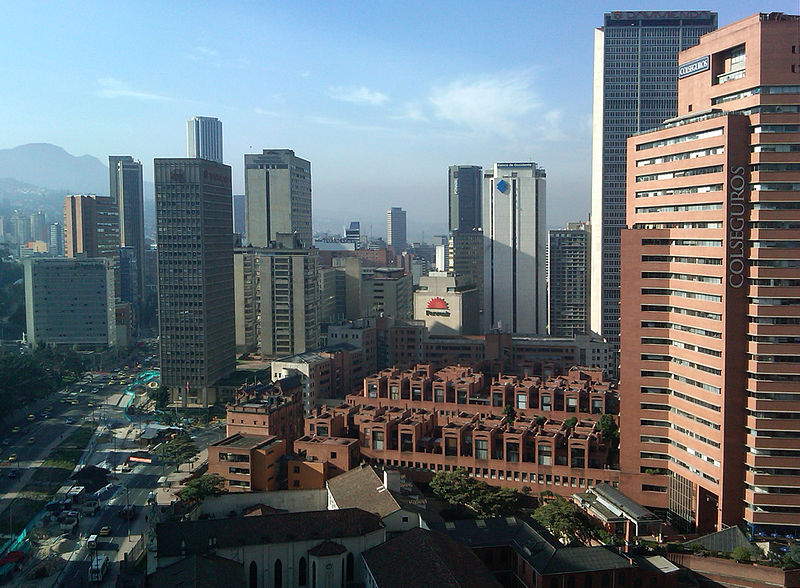
 Yesterday Vice President Biden visited Bogota to meet with Colombian President Juan Manuel Santos. Their visit underscored the close ties between the United States and Colombia, founded upon shared democratic values, deepening economic ties, and a long history of shared security goals. The visit highlighted our cooperation in the following areas:
Yesterday Vice President Biden visited Bogota to meet with Colombian President Juan Manuel Santos. Their visit underscored the close ties between the United States and Colombia, founded upon shared democratic values, deepening economic ties, and a long history of shared security goals. The visit highlighted our cooperation in the following areas:
- Free Trade: Since the 2012 entry into force of the Colombia-U.S. Trade Promotion Agreement, U.S. exports have increased 13.8 percent and U.S. foreign direct investment in Colombia has increased 30.3 percent. Colombia diversified its export base with 1,609 companies exporting goods to the United States for the first time. This growth has created jobs in both countries and assisted both small and international businesses. Through the Small Business Network of the Americas and the Latin America IDEA Network, Colombian and U.S. small businesses have developed connections and partnerships to trade internationally and take full advantage of deepening U.S.-Colombia economic relations.
- Labor Action Plan: The United States and Colombia work together closely on implementation of the Colombian Action Plan Related to Labor Rights, in which the Government of Colombia agreed to address concerns on labor issues. The United States and Colombia have agreed to continue regular meetings on the issues under the Action Plan through at least 2014. Both countries recognize the meaningful progress made under the Action Plan, as well as areas where challenges remain.
- Energy: The United States-Colombia partnership on energy is expanding, including efforts to link energy markets and develop unconventional energy sources to deliver affordable energy across the Americas. Together, the United States and Colombia launched the Connect 2022 initiative at the Summit of the Americas, which is helping to promote electrical grid interconnection across Mesoamerica. The U.S. government has also provided Colombia with technical assistance to establish strong regulatory frameworks for the development of unconventional, offshore, and coal bed methane hydrocarbons. In July, Colombian offshore oil regulators are scheduled to participate in a technical visit to Washington, DC, and New Orleans to discuss U.S. regulatory policy and practices.
- Information and Communications Technology (ICT): Building on a commitment of Presidents Obama and Santos, we will hold the inaugural high-level meeting of the ICT Steering Group in Colombia in the coming months. We are developing a robust agenda focused on identifying tangible ways high-speed internet access will provide isolated communities expanded economic opportunities, increased government presence, and better access to education and healthcare. The United States will also bring a delegation of U.S. investors to Colombia to explore business opportunities in the ICT sector.
- Expanding Opportunity for Vulnerable Populations, including Afro-Colombians: The United States and Colombia continue to work to advance the U.S.-Colombia Action Plan on Racial and Ethnic Equality (CAPREE) to address challenges faced by indigenous and Afro-descendent communities in Colombia and the United States. One example is the Beca Program. In collaboration with the Colombian National Police, the U.S. Embassy promotes the inclusion of minorities and women into the police force through a scholarship program to provide career opportunities for historically poor and underprivileged minority women and men to increase their representation in the police force. There are more than 400 scholarships planned for both 2014 and 2015. Through the U.S. Embassy-sponsored Martin Luther King program, more than 230 talented Afro-Colombian and indigenous university students have studied English at binational centers in Colombia. Another 130 scholars will be selected in September.
- Environment: On May 28, the United States announced a new USAID deal with the Althelia Climate Fund to lend up to $133.8 million in commercial financing for forest conservation and sustainable land use globally. The Althelia program is global, but it originated in Colombia, where USAID works with 19 Afro-Colombian communities, NASA, and three private sector partners to conserve 700,000 hectares of tropical forest, expand cacao and other productive enterprises, and sequester 2.1 million metric tons per year of carbon dioxide to mitigate climate change. Benefiting more than 19,000 Afro-Colombian families in the Pacific, the project will leverage $20 million in additional investment in the region over the next 10 years.
- Bilingual Colombia: The United States and Colombia have long partnered to promote English teaching in Colombia and Spanish teaching in the United States through the Fulbright Program. Since 2007, the United States has directly supported instruction for nearly 50,000 students and over 11,000 teachers who have since reached hundreds of thousands of students. In 2013, the United States expanded English teacher training to public school teachers via teacher colleges. Currently, the United States is working with the Colombian government to provide professional development to 500 future public school teachers in English and language pedagogy. Programs for English instruction, academic advising, educational exchange, and mentoring reach hundreds of underserved youth per year at sites throughout Colombia. Local binational centers are working to reach thousands more through online programs like EnglishNet, which uses voice recognition to teach people to read, and Trace Effects, an online English-teaching video game. Highly qualified U.S. educators in the field of Teaching English to Speakers of Other Languages spend two weeks to ten months each year at host institutions in Colombia training teachers and working on curriculum and materials development. Dozens of Colombian teachers of English have also benefited from online graduate-level courses through the E-Teacher Scholarship Program.
- 100,000 Strong in the Americas: The United States and Colombia are committed to expanding educational and professional exchanges between their citizens and institutions. In March 2011, President Obama launched “100,000 Strong in the Americas,” an initiative to increase international study in Latin America and the Caribbean. In academic year 2012-2013, 6,543 Colombian students studied in the United States, making it the third largest sending country in the region. To build on this and to increase two-way student exchange, two Colombian universities received 100,000 Strong in the Americas innovation grants. The funds will create institutional linkages to facilitate study abroad between the United States and Colombia. The U.S. government also supports 10 EducationUSA student advising centers in Colombia which offer accurate, current, and comprehensive information to Colombian students about study in the United States.
Source: White House




